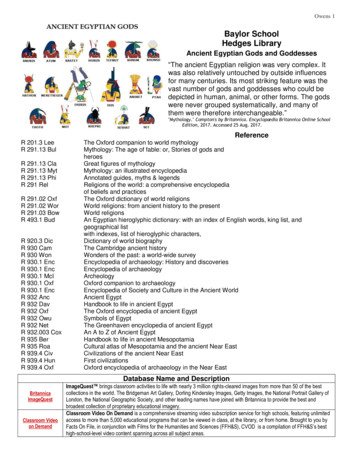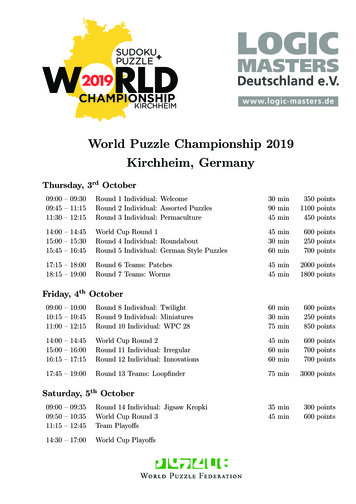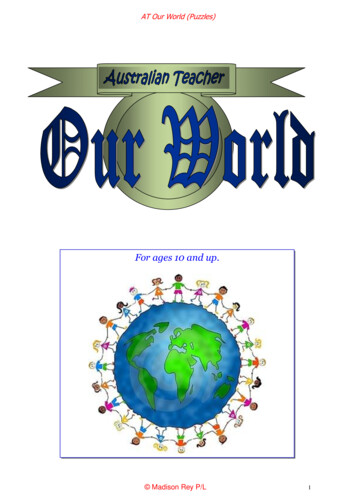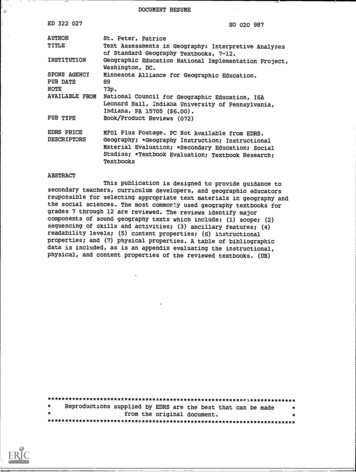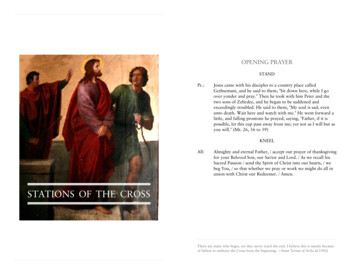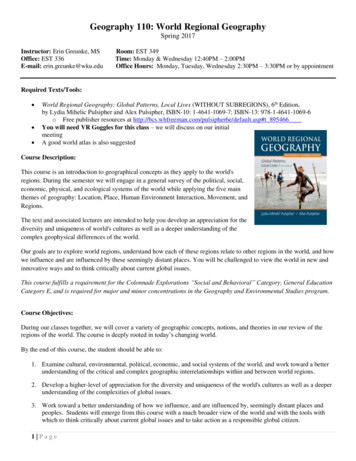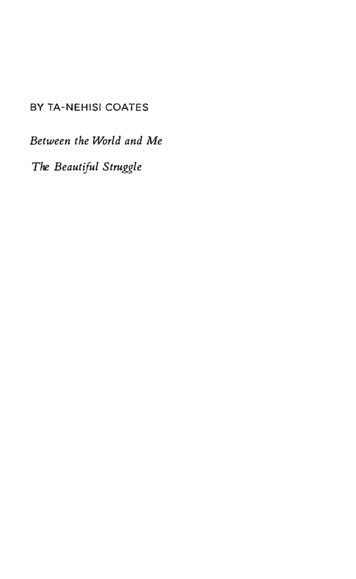
Transcription
BY TA-NEHISI COATESBetween the World and MeThe Beautiful Struggle
Betweenthe Worldand Me
Betweenthe Worldand MeTa-N ehisi CoatesSPIEGEL&NEW YORKGRAU
Between tlze World and Me is a work of nonfiction. Some names and identifyingdetails have been changed.Copyright 2015 byTa-Nehisi CoatesAll rights reserved.Published in the United States by Spi gel & Grau, an imprint ofRandomHouse, a division of Penguin Random House LLC, NewYork.SPIEGEL & GRAU and the HOUSE colophon are registered trademarksof Penguin Random House LLC.The title of this work is drawn from the poem "Between theWorld and Me"byRichardWright, from White Man Listen! copyright 1957 by RichardWright. Used by permission of John Hawkins & Associates, Inc., and the EstateofRichardWright.Grateful acknowledgn1ent is made to the following for permission to reprintpreviously published material:Chris Calhoun Agency: Excerpt from "Ka' Ba" by Amiri Baraka, copyright Estate of Amiri Baraka.Reprinted by permission of the Chris Calhoun Agency.John Hawkins & Associates, Inc., and the Estate ofRichardWright: Excerptfrom "Between theWorld and Me" from VVhite Man Listen! by RichardWright,copyright 1957 byRichardWright.Reprinted by permission of JohnHawkins & Associates, Inc., and the Estate ofRichard Wright.Sonia Sanchez: Excerpt fro1n "Malcolm"from Shake Loose My Skin by SoniaSanchez (Boston: Beacon Press, 1999), copyright 1999 by Sonia Sanchez.Reprinted by permission of Sonia Sanchez.ISBN 978-0-8129-9354-7eBook ISBN 978-0-679-64598-6Printed in the United States of America on acid-free paperrandomhousebooks.comspiegelandgrau.com19 18 17 16 15 14Book design by Caroline Cunningham
For David and Kenyatta,who believed
And one morning while in the woods I stumbled suddenlyupon the thing,Stumbled upon it in a grassy clearing guarded by scaly oaksand elmsAnd the sooty details of the scene rose, thrusting themselvesbetween the world and me. . . .-RICHARD WRIGHT
Betweenthe Worldand Me
I.Do not speak to me of martyrdom,of men who die to be rememberedon some parish day.I don'tbelieve in dyingthough, I too shall die.And violets like castanetswill echo me.SONIA SANCHEZ
Son,Last Sunday the host of a popular news show asked mewhat it meant to lose my body. The host was broadcastingfrom Washington, D.C., and I was seated in a remote stu dio on the far west side of Manhattan. A satellite closedthe miles between us, but no machinery could close thegap between her world and the world for which I hadbeen summoned to speak. W hen the host asked me aboutmy body, her face faded from the screen, and was replacedby a scroll of words, written by me earlier that week.The host read these words for the audience, and whenshe finished she turned to the subject of my body, al though she did not mention it specifically. But by now Iam accustomed to intelligent people asking about thecondition of my body without realizing the nature of theirrequest. Specifically, the host wished to know why I felt
6TA- N E H I S J COATESthat white America's progress, or rather the progress ofthose Americans who believe that they are white, was builton looting and violence. Hearing this, I felt an old andindistinct sadness well up in me. The answer to this ques tion is the record of the believers themselves. The answeris American history.There is nothing extreme in this statement. Americansdeify democracy in a way that allows for a dim awarenessthat they have, from time to time, stood in defiance oftheir God. But democracy is a forgiving God and Amer ica's heresies-torture, theft, enslavement-are so commonamong individuals and nations that none can declare them selves immune. In fact, Americans, in a real sense, havenever betrayed their God. W hen Abraham Lincoln de clared, in 1863, that the battle of Gettysburg must ensure"that government of the people, by the people, for thepeople, shall not perish from the earth," he was not merelybeing aspirational; at the onset of the Civil War, the UnitedStates of America had one of the highest rates of suffragein the world. The question is not whether Lincoln trulymeant "government of the people" but what our countryhas, throughout its history, taken the political term "peo ple" to actually mean. In 1863 it did not mean your motheror your grandmother, and it did not mean you and me.Thus America's problem is not its betrayal of "governmentof the people," but the means by which "the people" ac quired their names.This leads us to another equally important ideal, one
B E T W E E N T H E WORLD A N D M E7that Americans implicitly accept but to which they makeno conscious claim. Americans believe in the reality of"race" as a defined, indubitable feature of the naturalworld. Racism-the need to ascribe bone-deep features topeople and then humiliate, reduce, and destroy them inevitably follows from this inalterable condition. In thisway, racism is rendered as the innocent daughter of Mother'Nature, and one is left to deplore the Middle Passage orthe Trail of Tears the way one deplores an earthquake, atornado, or any other phenomenon that can be cast as be yond the handiwork of men.But race is the child of racism, not the father. And theprocess of naming "the people" has never been a matter ofgenealogy and phy siognomy so much as one of hierarchy.Difference in hue and hair is old. But the belief in the pre eminence of hue and hair, the notion that these factors cancorrectly organize a society and that they signify deeperattributes, which are indelible-this is the new idea at theheart of these new people who have been brought up hope lessly, tragically, deceitfully, to believe that they are white.These new people are, like us, a modern invention. Butunlike us, their new name has no real meaning divorcedfrom the m;chinery of criminal power. The new peoplewere something else before they were white-Catholic,Corsican, Welsh, Mennonite, Jewish-and if all our na tional hopes have any fulfillment, then they will have to besomething else again. Perhaps they will truly becomeAmerican and create a nobler basis for their myths. I can-
8TA- N E H I S I COATESnot call it. As for now, it must be said that the process ofwashing the disparate tribes white, the elevation of thebelief in being white, was not achieved through wine tast ings and ice cream socials, but rather through the pillagingof life, liberty, labor, and land; through the flaying of backs;the chaining of limbs; the strangling of dissidents; the de struction of families; the rape of mothers; the sale of chil dren; and various other acts meant, first and foremost, todeny you and me the right to secure and govern our ownbodies.The new people are not original in this. Perhaps therehas been, at some point in history, some great power whoseelevation was exempt from the violent exploitation ofother human bodies. If there has been, I have yet to dis cover it. But this banality of violence can never excuseAmerica, because America makes no claim to the banal.America believes itself exceptional, the greatest and no blest nation ever to exist, a lone champion standing be tween the white city of democracy and the terrorists,despots, barbarians, and other enemies of civilization. Onecannot, at once, claim to be superhuman and then pleadmortal error. I propose to take our countrymen's claims ofAmerican exceptionalism seriously, which is to say I pro pose subjecting our country to an exceptional moral stan dard. This is difficult because there exists, all around us, anapparatus urging us to accept American innoc nce at facevalue and not to inquire too much. And it is so easy tolook away, to live with the fruits of our history and to ig-
BETWEEN T H E WORLD AND M E9nore the great evil ·done in all of our names. But you and Ihave never truly had that luxury. I think you know.I write you in your fifteenth year. I am writing you be cause this was the year you saw Eric Garner choked todeath for selling cigarettes; because you know now thatRenisha McBride was shot for seeking help, that JohnCrawford was shot down for browsing in a departmentstore. And you have seen men in uniform drive by andmurder Tamir Rice, a twelve-year-old child whom theywere oath-bound to protect. And you have seen men inthe same uniforms pummel Marlene Pinnock , someone'sgrandmother, on the side of a road. And you know now, ifyou did not before, that the police departments of yourcountry have been endowed with the authority to destroyyour body. It does not matter if the destruction is the resultof an unfortunate overreaction. It does not matter if itoriginates in a misunderstanding. It does not matter if thedestruction springs from a foolish policy. Sell cigaretteswithout the proper authority and your body can be de stroyed. Resent the people trying to entrap your body andit can be destroyed. Turn into a dark stairwell and yourbody can be destroyed. T he destroyers will rarely be heldaccountable. Mostly they will receive pensions. And de struction is merely the superlative form of a dominionwhose prerogatives include friskings, detainings, beatings,and humiliations. All of this is common to black people.And all of this is old for black people. No one is held re sponsible.
10TA- N E H I S I COATESThere is nothing uniquely evil in these destroyers oreven in this moment. The destroyers are merely men en forcing the whims of our country, correctly interpretingits heritage and legacy . It is hard to face this. But all ourphrasing-race relations, racial chasm, racial justice, racialprofiling, white privilege, even white supremacy-servesto obscure that racism is a visceral experience, that it dis lodges brains, blocks airways, rips muscle, extracts organs,cracks bones, breaks teeth. You must never look away fromthis. You must always remember that the sociology, thehistory, the economics, the graphs, the charts, the regres sions all land, with great violence, upon the body.That Sunday, with that host, on that news show, I triedto explain this as best I could within the time allotted. Butat the end of the segment, the host flashed a widely sharedpicture of an eleven-year-old black boy tearfully hugginga white police officer. Then she asked me about "hope."And I knew then that I had failed. And I remembered thatI had expected to fail. And I wondered again at the indis tinct sadness welling up in me. Why exactly was I sad? Icame out of the studio and walked for a while. It was acalm December day. Families, believing themselves white,were out on the streets. Infants, raised to be white, werebundled in strollers. And I was sad for these people, muchas I was sad for the host and sad for all the people out therewatching and reveling in a specious hope. I realized thenwhy I was sad. When the journalist asked me about mybody, it was like she was asking me to awaken her from the
BETWEEN T H E WORLD A N D M E11most gorgeous dream. I have seen that dream all my life. Itis perfect houses with nice lawns. It is Memorial Daycookouts, block associations, and driveways. The Dream istreehouses and the Cub Scouts. The Dream smells likepeppermint but tastes like strawberr y shortcake. And forso long I have wanted to escape into the Dream, to foldmy country over my head like a blanket. But this has neverbeen an option because the Dream rests on our backs, thebedding made from our bodies. And knowing this, know ing that the Dream persists by warring with the knownworld, I was sad for the host, I was sad for all those families,I was sad for my country, but above all, in that moment, Iwas sad for you.That was the week you learned that the killers of Mi chael Brown would go free. The men who had left hisbody in the street like some awesome declaration of theirinviolable power would never be punished. It was not myexpectation that anyone would ever be punished. But youwere young and still believed. You stayed up till 11 P.M.that night, waiting for the announcement of an indict ment, and when instead it was announced that there wasnone you said, "I've got to go," and you went into yourroom, and I heard you crying. I came in five minutes after,and I didn't hug you, and I didn't comfort you, because Ithought it would be wrong to comfort you. I did not tellyou that it would be okay, because I have never believed itwould be okay. What I told you is what your grandparentstried to tell me: that this is your country; that this is your
12TA- N E H I S J COATESworld, that this is your body, and you must find some wayto live within the all of it. I tell you now that the questionof how one should live within a black body, within acountry lost in the Dream, is the question of my life, andthe pursuit of this question, I have found, ultimately an swers itself.This must seem strange to you. We live in a "goal oriented" era. Our media vocabulary is full of hot takes,big ideas, and grand theories of everything. But some timeago I rejected magic in all its forms. This rejection was agift from your grandparents, who never tried to consoleme with ideas of an afterlife and were skeptical of preor dained American glory. In accepting both the chaos of his tory and the fact of my total end, I was freed to trulyconsider how I wished to live-specifically, how do I livefree in this black body? It is a profound question becauseAmerica understands itself as God's handiwork, but theblack body is the clearest evidence that America is thework of men. I have asked the question through my read ing and writings, through the music of my youth, througharguments with your grandfather, with your mother, youraunt Janai, your uncle Ben. I have searched for answers innationalist 1nyth, in classrooms, out on the streets, and onother continents. The question is unanswerable, which isnot to say futile. The greatest reward of this constant inter rogation, of confrontation with the brutality 9 my coun try, is that it has freed me from ghosts and girded meagainst the sheer terror of disembodiment.
14TA- N E H I S I COATESAnd I am afraid. I feel the fear most acutely wheneveryou leave me. But I was afraid long before you, and in thisI was unoriginal. W hen I was your age the only people Iknew were black, and all of them were power:fully, ada mantly, dangerously afraid. I had seen this fear all my younglife, though I had not always recognized it as such.It was always right in front of me. The fear was there inthe extravagant boys of my neighborhood,,in their largerings and medallions, their big puffy coats and full-lengthfur-collared leathers, which was their armor against theirworld. They would stand on the corner of Gwynn Oakand Liberty, or Cold Spring and Park Heights, or outsideMondawmin Mall, with their hands dipped in Russellsweats. I think back on those boys now and all I see is fear,and all I see is them girding themselves against the ghostsof the bad old days when the Mississippi mob gathered'round their grandfathers so that the branches of the blackbody might be torched, then cut away. The fear lived onin their practiced bop, their slouching denim, their bigT-shirts, the calculated angle of their baseball caps, a cata log of behaviors and garments enlisted to inspire the beliefthat these boys were in firm possession of everything theydesired.I saw it in their customs of war. I was no older than five,sitting out on the front steps of my home on WoodbrookAvenue, watching two shirtless boys circle each other closeand buck shoulders. From then on, I knew that there wasa ritual to a street fight, bylaws and codes that, in their very
B E T W E E N T H E WORLD A N D M E15need, attested t o all the vulnerability o f the black teenagebodies.I heard the fear in the first music I ever knew, the musicthat pumped from boom boxes full of grand boast andbluster. The boys who stood out on Garrison and Libertyup on Park Heights loved this music because it told them,against all evidence and odds, that they were masters oftheir own lives, their own streets, and their own bodies. Isaw it in the girls, in their loud laughter, in their gildedbamboo earrings that announced their names thrice over.And I saw it in their brutal language and hard gaze, howthey would cut you with their eyes and destroy you withtheir words for the sin of playing too much. "Keep myname out your mouth;' they would say. I would watchthem after school, how they squared off like boxers, vas elined up, earrings off, Reeboks on, and leaped at eachother.I felt the fear in the visits to my Nana's home in Phila delphia. You never knew her. I barely knew her, but whatI remember is her hard manner, her rough voice. And Iknew that my father's father was dead and that my uncleOscar was dead and that my uncle David was dead andthat each of these instances was unnatural. And I saw it inmy own father, who loves you, who counsels you, whoslipped me money to care for you. My father was so veryafraid. I felt it in the sting of his black leather belt, whichhe appliedwithmore anxiety than anger, my father whobeat me as if someo e might steal me away, because that is
16TA- N E H IS I COATESexactly what was happening all around us. Ever yone hadlost a child, somehow, to the streets, to jail, to drugs, toguns. It was said that these lost girls were sweet as honeyand would not hurt a fly. It was said that these lost boys hadjust received a GED and had begun to turn their livesaround. And now they were gone,and their legacy was agreat fear.Have they told you this story? When your grandmotherwas sixteen years old a young man knocked on her door.The young man was your Nana Jo's boyfriend. No oneelse was home. Ma allowed this young man to sit and waituntil your Nana Jo returned. But your great-grandmothergot there first. She asked the young man to leave. Thenshe beat your grandmother terrifically, one last time, sothat she might remember how easily she could lose herbody. Ma never forgot. I remember her clutching my smallhand tightly as we crossed the street. She would tell methat ifl ever let go and were killed by an onrushing car,shewould beat me back to life. When I wassix, Ma and Dadtook me to a local park. I slipped from their gaze andfound a playground. Your grandparents spent anxiousminutes looking for .me. When they found me,Dad didwhat every parent I knew would have done--he reachedfor his belt. I remember watching him in a kind of daze,awed at the distance between punishment and offense.Later, I would hear it in Dad's voice-"Either I can beathim,or the police." Maybe that saved me. Maybe it didn't.All I know is, the violence rose from the fear like smoke
BETWEEN T H E WORLD A N D M E17from a fire, and I cannot say whether that violence, evenadministered in fear and love, sounded the alarm or chokedus at the exit. W hat I know is that fathers who slammedtheir teenage boys for sass would then release them tostreets where their boys employed, and were subject to, thesame justice. And I knew mothers who belted their girls,but the belt could not save these girls from drug dealerstwice their age. We, the children, employed our darkesthumor to cope. We stood in the alley where we shot bas ketballs through hollowed crates and cracked jokes on theboy whose mother wore him out with a beating in frontof his entire fifth-grade class. We sat on the number fivebus, headed downtown, laughing at some girl whosemother was known to reach for anything---cable wires,extension cords, pots, pans. We were laughing, but I knowthat we were afraid of those who loved us most. Our par ents resorted to the lash the way flagellants in the plagueyears resorted to the scourge.To be black in the Baltimore of my youth was to benaked before the elements of the world, before all theguns, fists, knives, crack, rape, and disease. The nakednessis not an error, nor pathology. The nakedness is the cor rect and intended result of policy, the predictable upshotof people forced for centuries to live under fear. The lawdid not protect us. And now; in your time, the law has be come an excuse for stopping and frisking you, which is tosay, for furthering the assault on your body. But a societythat protects some people through a safety net of schools,
18TA- N E H I S I COATESgovernment-backed home loans,and ancestral wealth butcan only protect you with the club of cri minal justice haseither failed at enforcing its good intentions or has suc ceeded at something much darker. However you call it,the result was our infir mity before the criminal forces ofthe world. It does not matter if the agent of those forces iswhite or black-what matters is our condition,what mat ters is the system that makes your body breakable.The revelation of these forces,a series of great changes,has unfolded over the course of my life. The changes arestill unfolding and will likely continue until I die. I waseleven years old,standing out in the parking lot in front ofthe 7-Eleven,watching a crew of older boys standing nearthe street. They yelled and gestured at .who?.anotherboy, young, like me, who stood there, almost smiling,gamely throwing up his hands. He had already learned thelesson he would teach me that day: that his body was inconstant jeopardy. Who knows what brought him to thatknowledge? The projects, a drunken stepfather, an olderbrother concussed by police, a cousin pinned in the cityjail. That he was outnumbered did not matter because thewhole world had outnumbered him long ago,and what donumbers matter? This was a war for the possession of hisbody and that would be the war of his whole life.I stood there for some seconds, mar veling at the olderboys' beautiful sense of fashion. They all wore ski jackets,the kind which,in my day,mothers put on layaway in Sep-
B E T W E E N T H E WORLD A N D M E19tember, then piled up overtime hours so as to have thething wrapped and ready for Christmas. I focused in on alight-skinned boy with a long head and small eyes. He wasscowling at another boy, who was standing close to me. Itwas just before three in the afternoon. I was in sixth grade.School had just let out, and it was not yet the fightingweather of early spring. What was the exact problem here?Who could know?The boy with the small eyes reached into his ski jacketand pulled out a gun. I recall it in the slowest motion, asthough in a dream. There the boy stood, with the gunbrandished, which he slowly untucked, tucked, then un tucked once more, and in his small eyes I saw a surgingrage that could, in an instant, erase my body. That was1986. That year I felt myself to be drowning in the newsreports of murder. I was aware that these murders veryoften did not land upon the intended targets but fell upongreat-aunts, PTA mothers, overtime uncles, and joyfulchildren-fell upon them random and relentless, like greatsheets of rain. I knew this in theory but could not under stand it as fact until the boy with the small eyes stoodacross from me holding my entire body in his small hands.The boy did not shoot. His friends pulled him back. Hedid not need to shoot. He had affirmed my place in theorder of things. He had let it be known how easily I couldbe selected. I took the subway home that day, processingthe episode all alone. I did not tell my parents. I did not tell
20TA- N E H I S I COATESmy teachers, and if! told my friends I would have done sowith all the excitement needed to obscure the fear thatcame over me in that moment.I remember being amazed that death could so easily riseup from the nothing of a boyish afternoon, billow up likefog. I knew that West Baltimore, where I lived; that thenorth side of Philadelphia, where my cousins lived; thatthe South Side of Chicago, where friends of my fatherlived, comprised a world apart. Somewhere out there be yond the firmament, past the asteroid belt, there wereother worlds where children did not regularly fear fortheir bodies. I knew this because there was a large televi sion resting in my living room. In the evenings I would sitbefore this television bearing witness to the dispatchesfrom this other world. There were little white boys withcomplete collections of football cards, and their only wantwas a popular girlfriend and their only worry was poisonoak. That other world was suburban and endless, organizedaround pot roasts, blueberry pies, fireworks, ice cream sun daes, immaculate bathrooms, and small toy trucks thatwere loosed in wooded backyards with streams and glens.Comparing these dispatches with the facts of my nativeworld, I came to understand that my country was a galaxy,and this galaxy stretched from the pandemonium of WestBaltimore to the happy hunting grounds of Mr. Belvedere. Iobsessed over the distance between that other sector ofspace and my own. I knew that my portion of the Ameri can galaxy, where bodies were enslaved by a tenacious
BETWEEN T H E WORLD A N D M E21gravity, was black and that the other, liberated portion wasnot. I knew that some inscrutable energy preserved thebreach. I felt, but did not yet understand, the relation be tween that other world and me. And I felt in this a cosmicinjustice, a profound cruelty, which infused an abiding, ir repressible desire to unshackle my body and achieve thevelocity of escape.Do you ever feel that same need? Your life is so verydifferent from my own. The grandness of the world, thereal world, the whole world, is a known thing for you.And you have no need of dispatches because you haveseen so much of the American galaxy and its inhabitants their homes, their hobbies-up close. I don't know what itmeans to grow up with a black president, social networks,omnipresent media, and black women everywhere in theirnatural hair. What I know is that when they loosed thekiller of Michael Brown, you said, "I've got to go." Andthat cut me because, for all our differing worlds, at yourage my feeling was exactly the same. And I recall that eventhen I had not yet begun to imagine the perils that tangleus.You still believe the injustice was Michael Brown. Youhave not yet grappled with your own myths and narrativesand discovered the plunder every where around us.Before I could discover, before I could escape, I had tosurvive, and this could only mean a clash with the streets,by which I mean not just physical blocks, nor simply thepeople packed into them, but the array of lethal puzzlesand strange perils that seem to rise up from the asphalt it-
22TA-N E H I S I COATESself. The streets transform every ordinary day into a seriesof trick questions, and every incorrect answer risks a beat down, a shooting, or a pregnancy. No one survives un scathed. And yet the heat that springs from the constantdanger, from a lifesty le of near-death experience, is thrill ing. This is what the rappers mean when they pronouncethemselves addicted to "the streets" or in love with "thegame:' I imagine they feel something akin to parachutists,rock climbers, BASE jumpers, and others who choose tolive on the edge. Of course we chose nothing. And I havenever believed the brothers who claim to "run," much less"own," the city. We did not design the streets. We do notfund them. We do not preserve them. But I was there,nevertheless, charged like all the others with the protec tion of my body.The crews, the young men who'd transmuted their fearinto rage, were the greatest danger. The crews walked theblocks of their neighborhood, loud and rude, because itwas only through their loud rudeness that they might feelany sense of security and power. They would break yourjaw, stomp your face, and shoot you down to feel thatpower, to revel in the might of their own bodies. And theirwild reveling, their astonishing acts made their names ringout. Reps were made, atrocities recounted. And so in myBaltimore it was known that when Cherry Hill rolledthrough you rolled the other way, that North and Pulaskiwas not an intersection but a hurricane, leaving only splin ters and shards in its wake. In that fashion, the security of
BETWEEN T H E WORLD A N D M E23these neighborhoods flowed downward and became thesecurity of the bodies living there. You steered clear ofJo Jo, for instance, because he was cousin to Keon, the don ofMurphy Homes. In other cities, indeed in other Balti mores, the neighborhoods had other handles and the boyswent by other names, but their mission did not change:prove the inviolability of their block, of their bodies,through their power to crack knees, ribs, and arms. Thispractice was so common that today you can approach anyblack person raised in the cities of that era and they can tellyou which crew ran which hood in their city; and they cantell you the names of all the captains and all their cousinsand offer an anthology of all their exploits.To survive the neighborhoods and shield my body, Ilearned another language consisting of a basic comple ment of head nods and handshakes. I memorized a list ofprohibited blocks. I learned the smell and feel of fightingweather. And I learned that "Shorty, can I see your bike?"was never a sincere question, and "Yo, you was messingwith my cousin" was neither an earnest accusation nor amisunderstanding of the facts. These were the summonsesthat you answered with your left foot forward, your rightfoot back, your hands guarding your face, one slightlylower than the other, cocked like a hammer. Or they wereanswered by breaking out, ducking through alleys, cuttingthrough backyards, then bounding through the door pastyour kid brother into your bedroom, pulling the tool outof your lambskin or from under your mattress or out of
24TA- N E H I S I COATESyour Adidas shoebox, then calling up your own cousins(who really aren't) and returning to that same block, onthat same day, and to that same crew, hollering out, "Yeah,nigger, what's up now?" I recall learning these laws clearerthan I recall learning my colors and shapes, because theselaws were essential to the security of my body.I think of this as a great difference between us. You havesome acquaintance with the old rules, but they are not asesse
The Beautiful Struggle . Between the World and Me . Between the World and Me Ta-N ehisi Coates SPIEGEL & GRAU . Book design by Caroline Cunningham . For David and Kenyatta, . picture of an eleven-year-old black boy tearfully huggin




